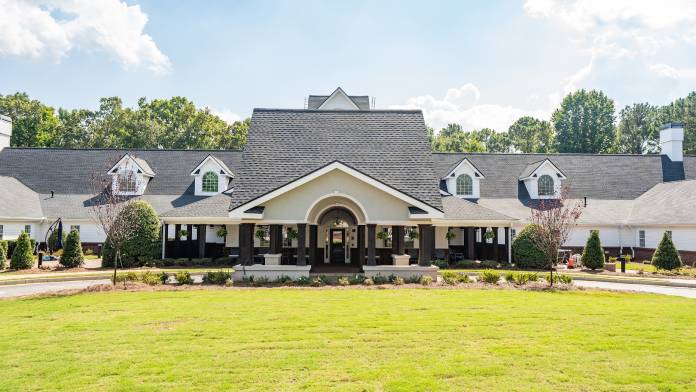The Recovery Village Atlanta

About The Recovery Village Atlanta
The Recovery Village Atlanta is a substance use and co occurring disorder treatment center. They have facilities throughout Georgia, including the Atlanta location on Pointe Place in Roswell. They offer medical detox, medication assisted treatment (MAT), residential rehab, partial hospitalization (PHP), and Dual Diagnosis (co occurring disorder) treatment programs.
The detox program at this facility is an inpatient detox. You’ll first be evaluated to determine the best treatment plan. Your treatment plan is based on the types of substances you use, your mental and physical state, and whether you have any co occurring disorders. Co occurring disorders are mental health challenges such as bipolar disorder, depression, and anxiety.
You’ll detox in a private room where you’ll have 24/7 medical care. You’ll eat nutritious foods that are easy on your digestive system. Medical staff will administer medications to ease any uncomfortable withdrawal symptoms. You may be put on MAT to help reduce cravings and make detox easier. MAT is commonly used for opioid withdrawal but it’s also an effective therapy for alcohol withdrawal. An element of MAT treatment is individual and group therapy.
While undergoing detox, you’ll start individual counseling first with a licensed therapist. Getting to the root of your substance use is important. Once you identify the root of your addiction, such as a co-occurring mental health disorder, then it’s easier to learn how to manage the issues that trigger your substance use. The length of detox varies from person to person but a typical detox is between seven and 10 days.
After you’ve detoxed, the treatment team can help you decide on the next step in your treatment. You may stay in the inpatient program or move to one of the outpatient programs. When you’ve finished inpatient or outpatient treatment, there are aftercare programs to help you maintain your sobriety. Relapse is a common component of addiction, and participation in an aftercare program helps reduce relapse. The aftercare program helps connect you to recovery resources and support groups and guides you in a relapse prevention plan.
| Levels of Care | Detox Service Setting | Programs | Payment Options |
|---|---|---|---|
|
Inpatient and residential programs provide round-the-clock medical and emotional support as you live at the treatment facility. This level of care may be recommended if you have severe addictions or mental health conditions since it removes outside distractions and allows you to focus solely on therapy. |
In outpatient therapy, you’ll attend therapy sessions several times each week while living at home. This is ideal if you have a strong support system and a lower risk of relapse. Outpatient treatment offers flexibility to maintain work, school or family obligations. |
||
|
Inpatient detox occurs in a dedicated treatment facility. You’ll live there around the clock and receive intensive medical support and supervision to help manage your withdrawal symptoms. It is suitable for individuals with moderate to severe addictions as it ensures a stable detox environment. |
Outpatient detox gives you access to medically supervised withdrawal services while still allowing you to live at home. You’ll attend a clinic for treatment and monitoring. This flexible option is suitable for those with mild to moderate withdrawal symptoms who have strong support systems. |
||
|
Alcohol detox programs offer medical support to help individuals withdraw safely from alcohol. Your care team may use medications to ease your symptoms and provide medical monitoring to address complications. |
Drug detox programs support individuals who are withdrawing from addictive substances like cocaine and heroin. Medical support helps you manage symptoms in a controlled and safe environment so you can achieve initial sobriety. |
||
|
Private Insurance
|
Self Pay
|
Levels of Care
Inpatient and residential programs provide round-the-clock medical and emotional support as you live at the treatment facility. This level of care may be recommended if you have severe addictions or mental health conditions since it removes outside distractions and allows you to focus solely on therapy.
In outpatient therapy, you’ll attend therapy sessions several times each week while living at home. This is ideal if you have a strong support system and a lower risk of relapse. Outpatient treatment offers flexibility to maintain work, school or family obligations.
Detox Service Setting
Inpatient detox occurs in a dedicated treatment facility. You’ll live there around the clock and receive intensive medical support and supervision to help manage your withdrawal symptoms. It is suitable for individuals with moderate to severe addictions as it ensures a stable detox environment.
Outpatient detox gives you access to medically supervised withdrawal services while still allowing you to live at home. You’ll attend a clinic for treatment and monitoring. This flexible option is suitable for those with mild to moderate withdrawal symptoms who have strong support systems.
Programs
Alcohol detox programs offer medical support to help individuals withdraw safely from alcohol. Your care team may use medications to ease your symptoms and provide medical monitoring to address complications.
Drug detox programs support individuals who are withdrawing from addictive substances like cocaine and heroin. Medical support helps you manage symptoms in a controlled and safe environment so you can achieve initial sobriety.
Contact

Susan is a freelance writer and photographer who loves writing from home with her dog, Jack Bauer, at her feet. Having transcribed patient charts in a mental health and addiction treatment hospital, she’s well informed on the subject of substance use and co-occurring disorder treatment. She’s experienced in content creation and writes her own photography blog and newsletter.

Courtney Myers writes and edits professionally from her home in North Carolina. She holds an MS in Technical Communication from N.C. State University and has worked in proposal management, marketing, and online content creation. She specializes in creating resources related to behavioral health and addiction recovery.



